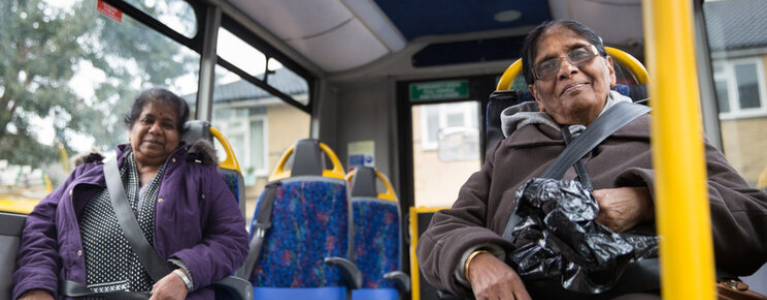
2020 has been a challenging year for so many. Many of London’s 1.3 million disabled people have experienced health, social and financial challenges brought on by the pandemic. The pandemic deepened some long-standing inequalities and discrimination which disabled people can experience. Our work to support disabled people in the capital is wide-ranging. Access, the theme of the 2020 Disability History Month, is a key area for action for us in London. We’re working hard to make the London’s streets, built environment and transport network more accessible. The Mayor is a champion for inclusive learning opportunities, employment support and training. We recognise there is more to do to truly ensure London is an accessible and inclusive city for people with disabilities. Here are 20 ways the Mayor and GLA are working to make London more inclusive and accessible:
- Boosting support for Deaf and Disabled People’s organisations (DDPOs) working at the Covid frontline – we’ve supported disability frontline organisations to step up and support disabled Londoners through contributions to the London Community Response Fund.
- Promoting public health information in accessible formats – we’ve promoted Covid health information in accessible formats including Easy read and British Sign Language.
- Raising public awareness of social distancing – the Mayor supported RNIB’s #WorldUpsideDown campaign to raise public awareness of the challenges many blind and partially sighted people experience when trying to social distance.
- More step-free access on the transport network - in early October Cockfosters became the 80th Tube station to become step-free. Read about TfL’s Independent Disability Advisory Group which plays a crucial role in helping TfL’s designers and customer service teams ensure journeys are safe and accessible.
- Helping young Londoners fulfil their potential – our Young Londoners Fund has awarded £1.8m to projects for young people with Special Education Needs and Disabilities. Deafinitely Theatre, Hillington Autistic Care and Support and Royal Society for Blind Children are amongst the 25 grantees.
- Leading by example in accessible employment – we run Steps Into Work, a supported internship programme. Open to people with moderate learning disabilities and/or those on the autism spectrum, Steps Into Work reduces barriers to employment. Three candidates reaching the end of their placements at the GLA, shared their experiences and highlights - from improving their IT skills to meeting the Mayor of London - in this blog.
- Supporting Early Years – the Mayor’s London Early Years Campaign is improving early identification for children with autism in a dedicated project with London Borough of Islington and Whittington Health. This work supports early years providers to improve early identification of children with additional needs and promotes free early education for 2-year-olds amongst families of children with special educational needs and disabilities (SEND).
- Running inspiring and inclusive STEM projects for young people – children with special education needs and disabilities from 20 schools are participating in projects to foster an interest in science, technology, engineering and maths (STEM). Projects include the Mayor’s London Scientist and RE:CODE London which sees 9-11 year olds get to grips with real-life coding challenges.
- Producing Liberty Festival – we support D/deaf, disabled and neurodivergent artists with our annual Liberty Festival. Read Liberty curator Linda Rocco’s blog about this annual festival and the role of its new advisory group.
- Helping Londoners locate accessible housing – our online locator tool helps people find where in London accessible and specialist older persons housing is being built.
- Championing accessible housing standards – we’ve called for accessibility standards for new homes to be raised nationally in line with London policy. Quality accessible and adaptable homes for wheelchair users and those with mobility needs are vital to support independent living as our response to the Government consultation on Accessible Housing Standards sets out.
- Funding for specialist homes for older and disabled Londoners – the Mayor’s Care and Support Specialised Housing (CASSH) Fund is investing £100 million to provide older and disabled Londoners with well-designed, accessible homes, enabling them to have an appropriate level of care.
- A Disability Confident employer – we are a Disability Confident (Committed level) employer, working towards a truly inclusive and accessible workplace and culture for our disabled staff.
- Protecting employment rights – the Mayor’s Employment Rights Hub offers information for disabled workers on protection from discrimination and where to seek advice on employment flexible working and
- A commitment to inclusive design and access – inclusive design principles are integrated into our planning and public realm policy to ensure the built environment is safe and accessible
- World-leading inclusive culture and arts – we’re passionate about creativity and our Culture Seeds grants have supported accessible and inclusive arts culture projects including Croydon’s Club Soda for young people learning disabilities and a celebration of the work of Somali Deaf Centre captured in this film.
- Sport Unites – our community sports projects are supporting community organisations to run inclusive and accessible sports activities for disabled Londoners
- Careers programmes for SEND learners – this year we’ve extended the reach of our London Enterprise Adviser Network (LEAN) which connects schools and businesses and we’re rolling out the London SEND Careers Community of Practice to share best practice and create new resources.
- Tailored skills support for disabled learners – our Skills for Londoners Innovation Fund is helping skills providers like FE colleges to increase their expertise and capacity to support learners with special educational needs and disabilities. We’re also investing £6.5m in European Social Funding (ESF) to support Londoners aged 16-24 with Special Educational Needs or a Disability (SEND), who require intensive assistance to achieve sustained education, training, or employment results.
- Addressing hate crime – we’re funding a vital advocacy service delivered by Stay Safe East and Community Alliance To Combat Hate (CATCH) which supports victims of disability hate crime and works to increase crime reporting